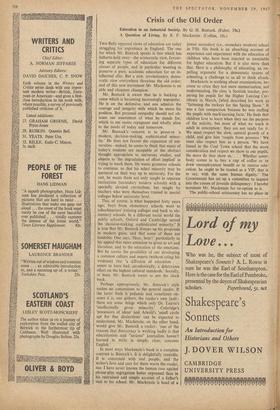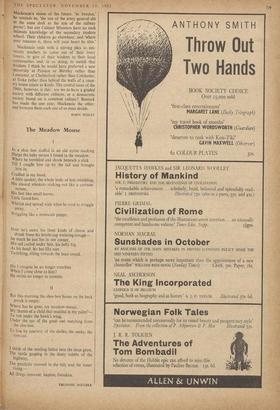Crisis of the Old Order
Two flatly opposed views of education are today struggling for supremacy in England. The one for which Mr. Bantock speaks is that which has hitherto held sway—the aristocratic view, favour- ing separate types of education for different classes of people, and in particular wanting to preserve a pure, academic education for an in- tellectual elite. But a new, revolutionary, demo- cratic view everywhere threatens the old order; and of this new movement Mr. Mackenzie' is an able and eloquent champion.
Mr. Bantock is aware that he is backing a cause which is becoming increasingly unpopular.
He is on the defensive, and one admires the courage and integrity with which he states his position. But personal sympathy should not ob- scure our assessment of what he stands for, which to me seems repugnant and wholly alien to the needs of today and tomorrow.
Mr. Bantock's concern is to preserve 'a modern, decision-making, sophisticated minor- ity.' He does not favour the expansion of uni- versities—indeed, he seems to think that many of today's students are incapable of the abstract thought appropriate to university studies, and objects to 'the degradation of effort implied' in trying to teach them. He wants grammar schools to continue, so that his select minority may be nurtured on their way up to university. For the rest, he wants them not only taught in sepirate institutions (secondary modern schools) with a specially devised curriculum, but taught by teachers who were themselves trained in special colleges below university level.
This, of course, is what happened forty years ago; boys from elementary schools went to schoolmasters' training colleges and back to ele- mentary schools. In a different social world the public schools, Oxford and Cambridge served the 'decision-making, sophisticated minority.' It is true that Mr. Bantock dresses up his proposals in modern guise, and that some of them are laudable. One says, 'Hear, hear I' particularly to his appeal that more attention be given to art and literature, and to the education of the emotions.
But he scorns the possibility of our developing a common culture and asserts (without citing his evidence) that 'a diffusion of education . . .
seems to have had, paradoxically, a deleterious effect on the highest cultural standards.' Socially, at least, Mr. Bantock wants to put the clock back.
Perhaps appropriately, Mr. Bantock's style makes no concessions to the general reader. If the latter finds it pedantic and sometimes ob- scure it is, one gathers, the reader's own fault: there are some things which only Dr. Leavis's 'intellectually given minority,' Coleridge's 'possessors of ideas' and Arnold's 'small circle apt for fine distinctions' can be expected to understand. Mr. Mackenzie, on the other hand, would give Mr. Bantock a rocket: 'one of the reasons that democracy is working badly is that educationists and "serious" journalists haven't learned to write in simple, clear, concrete English:.
In most ways Mackenzie's book is a complete contrast to Bantock's. It is delightfully readable.
It is concerned with real people, and the writer's love and care for them warm the reader, too. I have never known the human case against eleven-plus segregation better expressed than in his restrained and simple account of a father's visit to his school. Mr. Mackenzie is head of a
junior secondary (i.e., secondary modern) school in Fife. His book is an absorbing account of experience and experiment with the education of children who have been rejected as unsuitable for higher education. But it is also more than that. Here is a philosophy of educating, an im- pelling argument for a democratic system of schooling, a challenge to us all to think afresh.
Mackenzie is scathing about examinations, be- cause so often they test mere memorisation, not understanding. He cites 'a Scottish teacher, pre- paring his pupils for the Higher Leaving Cer- tificate in March, [who] described his work as "fattening the turkeys for the Spring Show." It was a fair comparison because he was stuffing the pupils with mark-earning facts.' He finds that children love to learn when they see the purpose of the activity, but most of what we teach is adult in conception: they are not ready for it. We must respect the slow, natural growth of a child, and give him 'respite from pressure.' We, must also respect him as a person. 'We have found in the Coal Town school that the more consideration and respect we show to our pupils, the more do they show us. . . . Whether some- body comes in to buy a cup of coffee or to draw unemployment benefit or to receive edu- cation, he ought to be treated as a VIP, that is to say, with the same human dignity.' The Government has set up a committee to inquire into the causes of juvenile delinquency : I hereby nominate Mr. Mackenzie for co-option to it.
The public-school aristocracy has no place in Mackenzie's vision of the future. `In Sweden,' be reminds us, 'the son of the army general sits at the same desk as the son of the railway porter'; but our Cabinet Ministers have no such intimate knowledge of the secondary modern school. Their children go elsewhere; and 'where your treasure is, there will your heart be also.'
Mackenzie ends with a stirring plea to uni- versity teachers to come out of their ivory lowers, to give of their wisdom to their local communities and, in so doing, to enrich that wisdom. I think he would have preferred a new university at Preston or Burnley rather than Lancaster, at Chelmsford rather than Colchester, at Stoke rather than behind the walls of a coun- try house estate at Keele. The central issue of the 1960s, however, is this: are we to have a graded society with different cultures, or a democratic society based on a common culture? Bantock has made the one case, Mackenzie the other; and between them each one of us must decide.
ROBIN PEDLEY































































 Previous page
Previous page